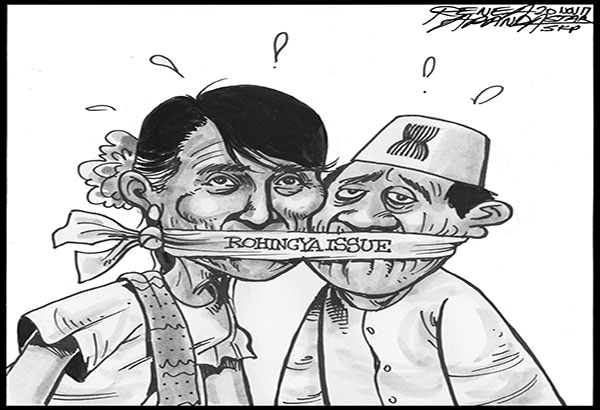EDITORIAL - Voice for the oppressed

After repeatedly telling foreigners to stop interfering in the way he’s running the government, President Duterte could not be expected to support a resolution approved overwhelmingly last week by 135 members of the United Nations human rights commission, condemning the violence against Rohingya Muslims in Myanmar and urging Naypyitaw to give them “full citizenship rights.”
But the Philippines can still be a voice for the humane treatment of displaced people, especially Muslims, with which President Duterte claims special affinity. The 57-nation Organization of Islamic Cooperation had introduced the UN resolution.
The Rohingyas have a troubled history in Myanmar. The latest crisis erupted after Rohingya militants launched coordinated attacks on 24 police outposts and an army base on Aug. 25, killing 11 government security forces. Inevitably, non-combatants, particularly women and children, have become the biggest casualties in the conflict. No one has dismissed as fake news the reports and images coming out of Myanmar’s Rakhine state, documenting atrocities perpetrated on the Rohingyas that can constitute ethnic cleansing.
During the just concluded summit of the Association of Southeast Asian Nations, the 10-member regional bloc also ignored calls to press Naypyitaw to end the persecution of the Rohingyas, who are considered by the Buddhist majority in the country as Bangladeshis illegally occupying land in Myanmar. Most of the 620,000 Rohingyas who have fled have taken refuge in Bangladesh.
ASEAN has a long-standing policy of non-interference in each member’s internal affairs. Apart from the Philippines, Cambodia, Laos and Vietnam together with China and Russia were among only 10 states that refused to support the UN committee resolution on the Rohingya.
In fact ASEAN had occasionally expressed what could be construed as interference in Myanmar affairs. The Philippines in particular had openly called on the military junta to implement democratic reforms and free then opposition leader Aung San Suu Kyi from house arrest. The junta gradually implemented reforms that paved the way for Suu Kyi’s rise to power. Ironically, Suu Kyi, now the de facto civilian leader of Myanmar, is under fire for her failure to stop the crackdown on the Rohingyas.
For a long time, Suu Kyi was seen as a powerful voice for the oppressed. A state has the right to defend itself against armed threats, but the Nobel Peace laureate is also aware of the basic rights of every human being. She can still speak for victims of abuse. ASEAN will go where Suu Kyi wants to take the grouping, and it will not constitute interference.
- Latest
- Trending























